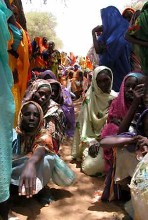Conflict affecting more people in Sudan’s Darfur region
NAIROBI, Sep 22, 2004 (IRIN) — The number of people affected by conflict
in the troubled western Sudanese region of Darfur rose to 1.8 million in
August, of whom 1.45 million were internally displaced persons (IDPs), the
United Nations said on Wednesday.
 “The number is higher because of a combination of two factors – we are now
“The number is higher because of a combination of two factors – we are now
accessing new areas and have registered new IDPs, and there have been
fresh arrivals of IDPs fleeing their villages,” Jennifer Abrahamson,
spokesperson for the UN Office for Coordination of Humanitarian Affairs
(OCHA) in Sudan told IRIN. “The number is likely to increase because we
are now reaching more rebel territory.”
According to the UN’s Darfur Humanitarian Profile for September, which was
released on Wednesday, another unknown number within Darfur’s estimated
population of six million who were neither IDPs nor host community had
also been affected.
“Despite the signalling of a ceasefire agreement on 8 April, general
insecurity persists throughout the region with continuing violence,
banditry and lawlessness by various armed groups,” it said. “The scale and
impact of the crisis on the civilian population continues to rise due to
an uncertain security environment.”
Many of the IDPs coming from rural areas had reported continuing
harassment and violence, the profile noted, especially sexual and
gender-based violence. “While it is clear that there are more police on
the ground, this has had little impact on the security situation as IDPs
continue to state that they have no confidence in the police,” it said.
“Humanitarian agencies are increasingly concerned about Darfur authorities
[who] plan to relocate or return displaced persons who have shown no
interest to return until a secure environment has been established,” it
added.
In Khartoum, however, a spokesman for the Sudanese armed forces, Gen
Mohamed Bashir Sulieman, denied that clashes were continuing between the
army and rebels in Darfur. The Sudan News Agency quoted the spokesman in a
statement as saying that the “military situation was stable all over the
Darfur region”.
The Darfur report was released as the UN High Commissioner for Human
Rights, Louise Arbour, and the Secretary-General’s Special Adviser on the
Prevention of Genocide, Juan Méndez, who are visiting Darfur, said they
had found a pervasive sense of fear in the IDP camps.
A UN spokesman, José Luis Díaz, said humanitarian conditions in the IDP
camps had improved, but the nature of the violence seemed to have shifted,
with fewer major attacks on villages but more reports of violence against
individuals, the UN reported.
UN Secretary-General Kofi Annan sent Arbour and Mendez to Darfur last week
to assess how the conflict-affected people there could be better protected
from attacks by government-allied militia, known as the Janjawid.
On Saturday, the UN Security Council adopted a US-sponsored resolution
threatening to “consider taking additional measures, including sanctions,
to affect Sudan’s oil sector and the government or its individual members”
unless there were tangible efforts to protect civilians in Darfur against
militia attacks.
The Council said that despite progress made by the Sudanese government in
lifting administrative obstructions to the delivery of humanitarian relief
in Darfur, Khartoum had not fully met its obligations outlined in an
earlier resolution calling on the government to improve security and
protect civilians.
But the Sudanese Foreign Ministry said in a statement on Monday that the
resolution had neglected the points included in the report of the
Secretary-General on what had been accomplished in the humanitarian and
security fields. It said the resolution had created a negative atmosphere
for the peace efforts.
“The government of Sudan believes that all parties should have been
committed under this circumstances to concentration of efforts for
supporting the efforts of the African Union (AU) that aim to achieve peace
instead of issuing resolutions that put pressures on the government only,”
the ministry statement said.
Meanwhile Amnesty International, in a statement issued on Tuesday, said
the picture in Darfur was one of distress, denial and disappointment.
“Distress of people whose lives and livelihood have been destroyed, denial
of responsibility by the Sudanese government and disappointment at the
slow progress to resolve this crisis,” it noted.
It said its delegates had visited Al Jeneina, Nyala and El Fasher, and met
with senior government ministers and officials in Khartoum and Darfur, as
well as international organizations and civil society representatives.
“The visit confirmed Amnesty’s earlier analysis of attacks on villages by
government supported militia, in some cases backed by the Sudanese armed
forces, killing civilians, looting and burning homes,” Amnesty said.
“While we found engagement and admission of violations of human rights and
international humanitarian law by some members of the government there was
total denial by others. Such denial is insulting to the victims,” Irene
Khan, Secretary-General of Amnesty International, said.
According to Amnesty, its delegates visited displaced people from nomadic
tribes now in Musai camp near Nyala, where they heard “mirror image”
accounts of killings and rapes said to have been committed by the
insurgents.
The conflict in Darfur pits the Sudanese military and militias said to be
allied to the government against rebels fighting to end alleged
marginalisation and discrimination of Darfur residents by the state. The
Janjawid militias have, however, been accused of committing atrocities
against civilians.
The fighting, which erupted early last year, has displaced about 1.2
million people and sent another 200,000 fleeing across the border into
Chad. The UN has described problems spawned by the fighting in Darfur as
currently the worst humanitarian crisis in the world.
